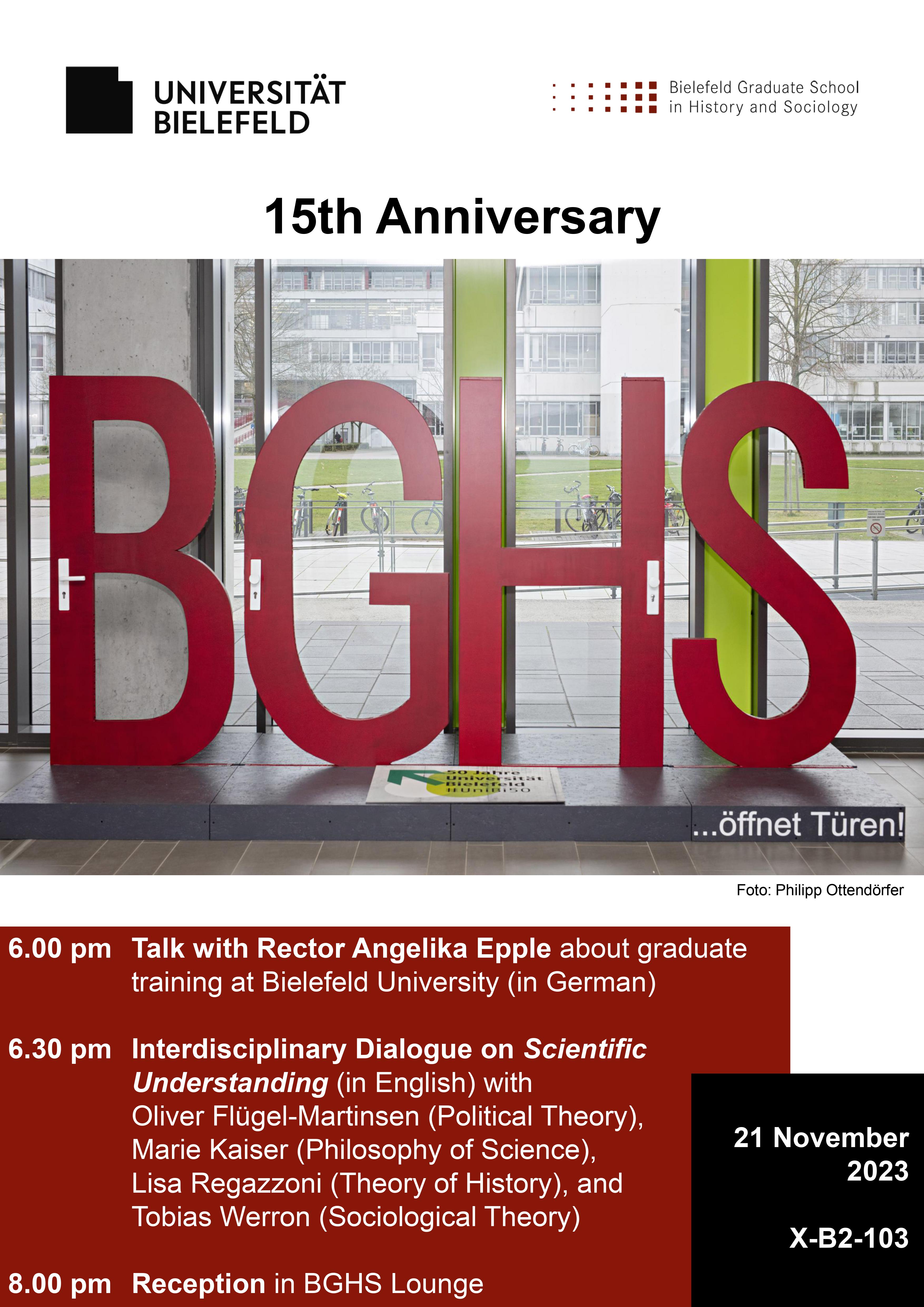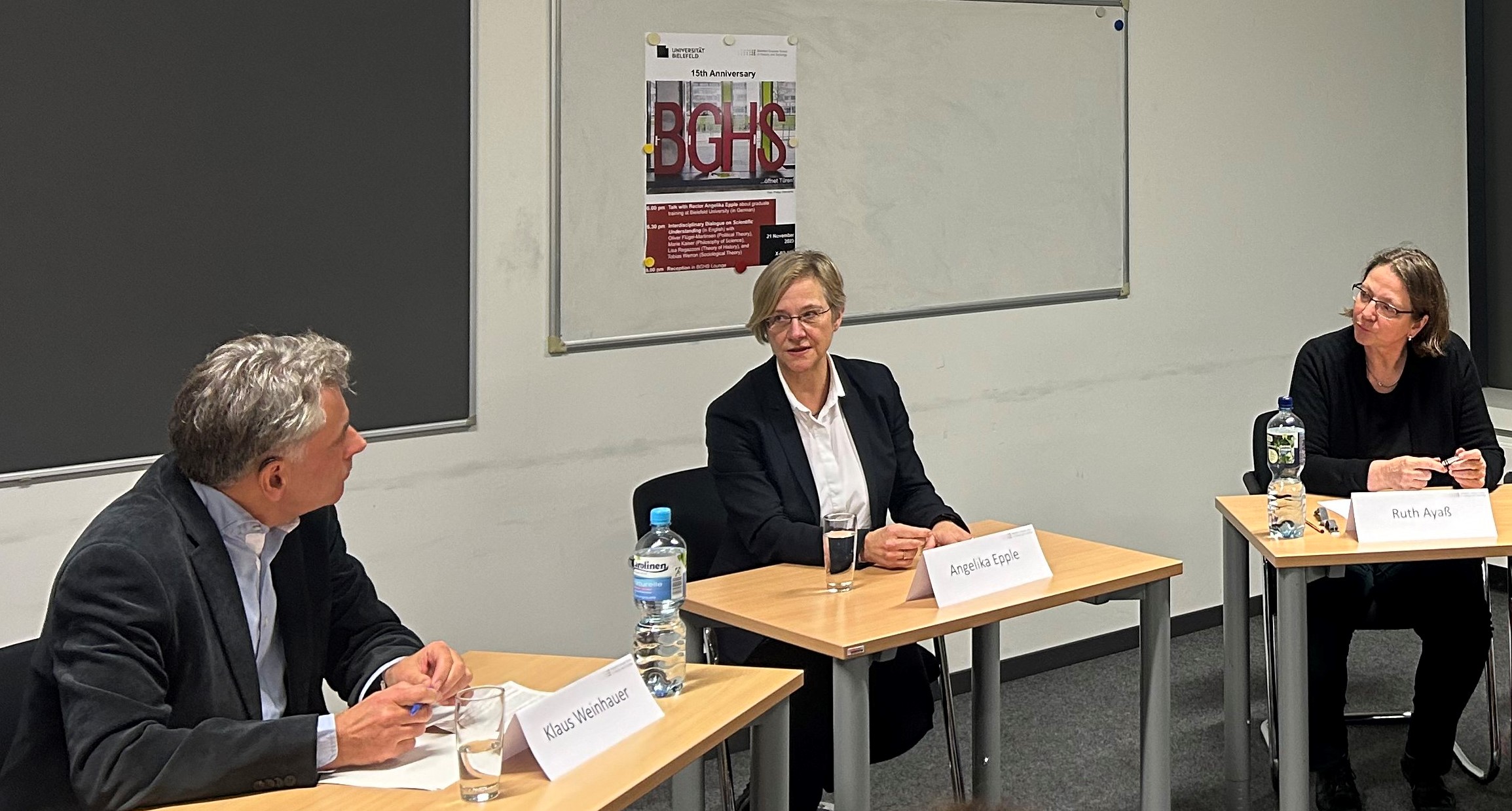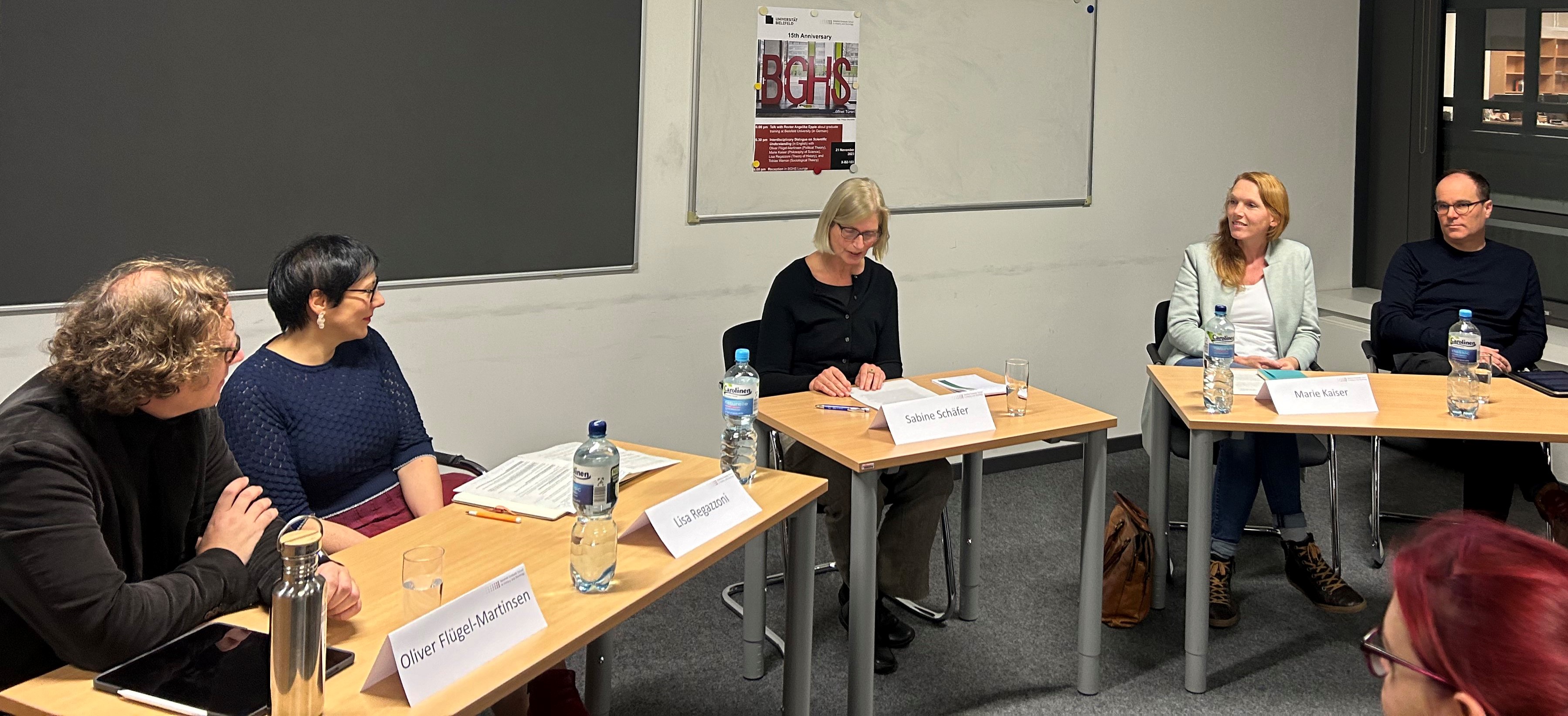BGHS.NEWS
BGHS celebrates its 15th anniversary
BGHS celebrates its 15th anniversary

On 21
November, the BGHS celebrated its 15th anniversary together with over 60
members and friends. Angelika Epple, the new rector of Bielefeld University,
who has been involved in the BGHS for many years as a doctoral supervisor, was
invited. She answered questions from the two BGHS directors Klaus Weinhauer and
Ruth Ayaß about the future of graduate funding at Bielefeld University. Oliver
Flügel-Martinsen, Marie Kaiser, Lisa Regazzoni and Tobias Werron then discussed
the hot topic of how scientific understanding can actually be understood.

From left to right: Klaus Weinhauer, Angelika Epple, Ruth Ayaß © Mariza Mathis
Angelika Epple took the opportunity to explain her concept of talent development at Bielefeld University, with which she started her term of office. She emphasised that everyone has talents, but that not all talents are developed, and certainly not at the same time. This means that talent development is an ongoing task: for the institution and for people in all status groups, not just for students or researchers in the qualification phase. The decision to write a doctoral thesis is an important step that is followed by other steps. Bielefeld University wants to provide support in reflecting on these steps and is therefore currently developing a concept for a graduate academy.
Ruth Ayaß welcomed this turn away from the paternalistic concept of the promotion of young researchers towards process-orientated talent development and asked what role interdisciplinarity could play in this. Angelika Epple recalled the times when history and sociology had a close relationship, but that they had grown apart over time and were now moving closer together again. However, she also emphasised that Bielefeld University has a tradition of what is known as major interdisciplinarity, which aims to promote exchange between the humanities and social sciences with the natural and technical sciences. When asked by Ruth Ayaß what role intermediary structures such as the BGHS could play in this, the Rector again referred to the planned Graduate Academy, in which various endeavours are to be bundled. In this context, Klaus Weinhauer emphasised how important it is for interdisciplinary exchange to have a clear profile of one's own discipline, whereupon Angelika Epple brought the expertise developed at the BGHS into play. The concept of the BGHS, in which both specialist programmes and transferable skills have a place, is convincing.
Klaus Weinhauer then brought the discussion to the topic of internationalisation. Angelika Epple noted that the BGHS is also good at this, as the current Blended Intensive Programme shows. Internationalisation cannot be developed top-down. However, it is possible to create opportunities for this, such as the European universities of the NEOLAiA network or the strategic partnerships with various international universities. Internationalisation thrives on the personal contacts that researchers maintain with one another. The institution must position itself in such a way that it can react to changes at an early stage. The establishment of a graduate academy should help Bielefeld University to attract good researchers from all over the world. That is site development.
Finally, Angelika Epple made an appeal to doctoral researchers and postdocs. She emphasised how important it is to get involved in the university during these phases and to help shape it, e.g. in academic self-administration. She knows from her own experience that you are busy with other things during this time: she herself had two children during this time. But today she realises how important the own commitment is.

From left to right: Oliver Flügel-Martinsen, Lisa Regazzoni, Sabine Schäfer, Marie Kaiser, Tobias Werron © Mariza Mathis
In the second part of the anniversary event, four professors from different disciplines at Bielefeld University met for the Interdisciplinary Dialogue on the topic of scientific understanding. Oliver Flügel-Martinsen (Political Theory and History of Ideas), Marie Kaiser (Philosophy of Science), Lisa Regazzoni (Theory of History) and Tobias Werron (Sociological Theory and General Sociology), moderated by Sabine Schäfer (executive manager of the BGHS), engaged in a lively dialogue on their different perspectives on scientific understanding.
Understanding is anything but self-evident, as the very different answers to the question about the respective disciplinary and personal perspectives on scientific understanding showed.
For Marie Kaiser, understanding a phenomenon scientifically means grasping it in its context. This requires explanations, specific knowledge or certain skills. If different perspectives are brought together, e.g. in interdisciplinary collaboration, then a more comprehensive understanding of the phenomenon can be achieved. However, it is necessary to find common ground, i.e. to find out which connections can be established between the different or differently processed phenomena.
Tobias Werron described what he sees as an essential characteristic of scientific understanding as a certain detachment from one's own experience. By using scientific theories or methods to distance themselves from their own experiences, for example, social scientists are able to turn everyday things that seem completely natural and self-evident to us into interesting research topics. Their own localisation in a particular discipline or research tradition is particularly evident in the fundamental questions that interest the researcher, in the case of the social sciences, for example, the question of how social order is possible.
For Lisa Regazzoni, one question also plays an important role in scientific understanding, namely the question: What do we want to know? And there are big differences between subjects. While the natural sciences are concerned with finding explanations, the humanities and social sciences try to create meaning. But here too, the focus has shifted over time from the question of why things happened to the question of how things happened, i.e. the contextualisation of events or processes in their conditions.
Oliver Flügel-Martinsen placed the process of scientific understanding in the context of hegemonic discursive formations. From this perspective, 'objectivity' and 'truth' are the results of political struggles, which does not necessarily mean that those who are now in power will always win. After all, conditions are constantly changing, albeit sometimes very slowly, and the meanings of what is being fought over are also changing. This applies to science just as it does to other areas of society, such as politics. Scientific 'truths' are also the result of specific hegemonic discourse formations.
The diversity of the concepts of scientific understanding made the discussion extremely exciting and varied. It became clear just how much of a prerequisite understanding is and what problems have to be overcome in the process. Ultimately, there always needs to be some kind of translation between different concepts, which in turn is associated with gains and losses at the level of meaning: a translation never contains the exact level of meaning of the original concept or idea, it loses part of it. But it also enables its own form of understanding and thus the production of new knowledge.
It was the BGHS's 6th Interdisciplinary Dialogue, and the format once again proved to be an excellent tool for open and respectful scientific debate. In any case, everyone still felt like celebrating the 15th BGHS birthday afterwards and stayed until the last canapé had been eaten and the last glass of wine drunk.